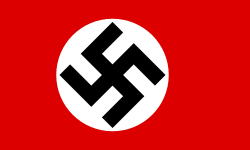
Back الإدارة العسكرية في أوكرانيا Arabic Ukrayna Reyxkomissarlığı Azerbaijani Рэйхскамісарыят Украіна Byelorussian Райхскамісарыят Украіна BE-X-OLD Reichskommissariat Ukraine Breton Reichskommissariat Ukraine Catalan Říšský komisariát Ukrajina Czech Reichskommissariat Ukraine Danish Reichskommissariat Ukraine German Reichskommissariat Ukraine Spanish
Reichskommissariat Ukraine | |||||||||||
|---|---|---|---|---|---|---|---|---|---|---|---|
| 1941–1944 | |||||||||||
| Anthem: Horst-Wessel-Lied ("The Horst Wessel Song") | |||||||||||
 Reichskommissariat Ukraine in 1942 | |||||||||||
| Status | Reichskommissariat of Nazi Germany | ||||||||||
| Capital | Kiev (de jure) Rovno (de facto) | ||||||||||
| Common languages |
| ||||||||||
| Demonym(s) | Crimean Tatars Ukrainians | ||||||||||
| Government | Reichskommissariat of Nazi Germany[1] | ||||||||||
| Reichskommissar | |||||||||||
• 1941–1944 | Erich Koch | ||||||||||
| Historical era | World War II | ||||||||||
| 22 June 1941 | |||||||||||
• Established | 20 August 1941 | ||||||||||
• Implement civil administration | 1 September 1941 | ||||||||||
• Remainder part of Generalbezirk Weißruthenien | 25 February 1944 | ||||||||||
• Formal disestablishment | 10 November 1944 | ||||||||||
| Area | |||||||||||
• Total | 340,000 km2 (130,000 sq mi) | ||||||||||
| Population | |||||||||||
• 1941 | 37,000,000 | ||||||||||
| Currency | Karbovanets | ||||||||||
| |||||||||||
| Today part of | |||||||||||
| History of Ukraine |
|---|
 |
The Reichskommissariat Ukraine (RKU; lit. 'Reich Commissariat of Ukraine') was an administrative entity of the Reich Ministry for the Occupied Eastern Territories of Nazi Germany from 1941 to 1944. It served as the German civilian occupation regime in the Ukrainian SSR, and parts of the Byelorussian SSR, Russian SFSR, and eastern Poland during the Eastern Front of World War II.
Ukraine was established after the early success of the Wehrmacht's Operation Barbarossa from territory under the military administration of Army Group South Rear Area. The German civil administration was based in Rovno (Rivne) with Erich Koch serving as the only Reichskommissar during its existence. Ukraine was part of the Generalplan Ost which included the genocide of the Jewish population, the expulsion and murder of some of the native non-Jewish population, the settlement of Germanic peoples, and the Germanization of the rest. The SS and their Einsatzgruppen, with active participation of the Order Police battalions and Ukrainian collaborators.[2] It is estimated 900,000 to 1.6 million Jews and 3[3] to 4[4] million non-Jewish Ukrainians were killed during the occupation; other sources estimate that 5.2 million Ukrainian civilians (of all ethnic groups) perished due to crimes against humanity, war-related disease, and famine amounting to more than 12% of Ukraine's population at the time.[5]
In the course of 1943 and 1944, the Red Army recaptured most of Ukraine in their advance westwards. Koch was appointed Reichskommissar of Reichskommissariat Ostland in August 1944 and it was formally dissolved on 10 November 1944
- ^ "Reichskommissariat Ukraine". www.encyclopediaofukraine.com. Retrieved 2020-03-03.
A German colony, the RKU constituted an important part of Adolf Hitler's Lebensraum and was completely deprived of autonomy or international status. Nazi plans called for the postwar unification of the RKU with the territory of the German Reich; most Ukrainians (considered unfit for Germanization) were to be resettled beyond the Urals to make room for German colonists. In fact Hitler was unable to inspire many Germans to colonize Ukraine. Despite ambitious plans only a few villages were cleared of their Ukrainian inhabitants and populated with Germans (both groups were resettled under duress). Those experiments were profoundly resented by the local population, which saw them as portents of German postwar intentions. Resettlement was also prevented by the German retreat and then by the formal liquidation of the RKU on 10 November 1944.
- ^ Alfred J. Rieber (2003). "Civil Wars in the Soviet Union" (PDF). pp. 133, 145–147. Archived from the original (PDF) on 2020-10-30. Retrieved 2022-06-20. Slavica Publishers.
- ^ Magocsi, Paul Robert (1996). A History of Ukraine. University of Toronto Press. p. 633. ISBN 9780802078209.
- ^ Michael Berenbaum (ed.), A Mosaic of Victims: Non-Jews Persecuted and Murdered by the Nazis, New York University Press, 1990; ISBN 1-85043-251-1
- ^ Vadim Erlikman. Poteri narodonaseleniia v XX veke: spravochnik. Moscow, 2004. ISBN 5-93165-107-1. pp. 21–35.
© MMXXIII Rich X Search. We shall prevail. All rights reserved. Rich X Search

